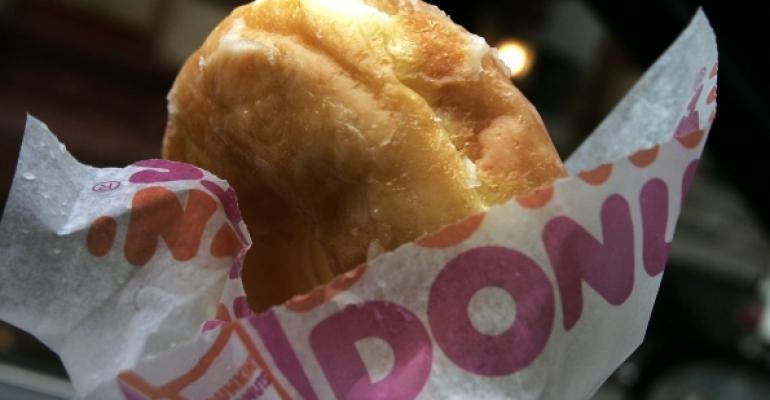Dunkin’ Donuts same-store sales fell 0.8 percent in the fourth quarter ended Dec. 26, parent company Dunkin’ Brands Inc. said Thursday, amid heavy price competition from convenience stores and quick-service restaurants.
Company executives said they are working with franchisees to improve value offerings and generate more transactions. Dunkin’ Donuts traffic declined 1 percent during the quarter, while average ticket rose 0.2 percentage points.
“Competition is fierce, and getting fiercer,” Dunkin’ Brands CEO Nigel Travis said during the company’s conference call Thursday. “In such a tough competitive environment, guests are letting us know that the price-value equation needs to work for them.
“It is clear to us that Dunkin’ Donuts needs to have more value offerings to drive traffic.”
Still, Dunkin’ expects flat to 2-percent same-store sales growth for 2016 as it works to attract more customers.
“We’re putting all of our efforts to get back to positive transactions,” Travis said.
Dunkin’ Brands’ stock price was flat in Thursday morning trading.
Franchisees tend to dictate pricing at the 11,750-unit chain. In some cases, Travis said, operators are pricing coffee and sandwiches higher than competitors in response to issues like rising minimum wages.
In a few cases, some are raising prices higher than competitor Starbucks Corp., although Travis said that the vast majority is priced well below that chain.
Nevertheless, he said, Dunkin’ plans to give operators more guidance on pricing going forward.
“It’s undoubtedly true we need to do more education with franchisees,” Travis said, adding that the company is adding people to help provide education and analysis.
“They’re going to get a lot more pricing guidance,” Travis said. “That’s all we can do in the future. Value is something that means a lot to us.”
Dunkin’ also said that warmer weather in the quarter led people to buy fewer hot coffee products, impacting fourth-quarter same-store sales by 0.7 percent.
“Higher temperatures impacted ritualistic buying habits,” Travis said, and iced coffee sales didn’t make up for the decline.
K-Cup sales also impacted results. Dunkin’ said that in-restaurant K-Cup and packaged coffee sales reduced same-store sales by 1.2 percentage points in the quarter.
Still, the sale of K-Cups in grocery stores has been successful. Dunkin’ said it has sold 150 million K-Cups in grocery stores since they were launched in May.
Still, value remains the biggest issue. Executives said they have worked with operators on “smart pricing” so that value promotions encourage additional sales.
For instance, a current Dunkin’ promotion offers two Egg and Cheese Sandwiches for $3, but Travis said customers order a total of $7 worth of food and beverages when they get that deal.
Dunkin’ isn’t just focusing on value, however. The company also said that it is working on more innovative premium offerings, employing a “classic barbell strategy” in which it focuses on both value and higher-priced items. Dunkin’ wants to improve its innovation process and reduce the time it takes to bring new products to market.
Additionally, Dunkin’ is working on “building its coffee culture” with more espresso-based beverages.
The chain also plans to improve its “focus on the basics” to enhance the customer experience inside restaurants. Digital efforts will be emphasized.
The company has high hopes for its DD Perks loyalty program, which is driving additional spending from customers in addition to more transactions. Loyal customers who are DD Perks members increased their average weekly spending 4.7 percent in the fourth quarter, executives said.
Dunkin’ also plans to expand a test of mobile ordering from a test market in Portland, Maine, into new markets. The program enables loyalty card customers to order on their smartphones and pick up orders while skipping the line.
“We’re confident in the work we’re doing to turn things around,” Travis said. “We’re confident in our strategic growth plan.”
Dunkin’ added 349 new locations in the U.S. in 2015, even after the closure of 81 self-service coffee stations inside Speedway gas stations.
Dunkin’ Brands ice cream concept Baskin-Robbins fared better in the fourth quarter. U.S. same-store sales rose 4.4 percent during the quarter and 6.1 percent for the year. The warm weather that hurt coffee sales at Dunkin’ boosted Baskin-Robbins sales of ice cream and ice cream cakes.
Fourth-quarter revenue at the company increased 5.5 percent, to $203.8 million, from $193.2 million the previous year, and rose 8.3 percent in the year, to $810.9 million, from $748.7 million. But fourth-quarter net income fell to a loss of $8.9 million, or 10 cents per share, from a profit of $52.5 million, or 50 cents per share, the previous year.
For the year, net income declined 40.3 percent, to $105.2 million, from $176.4 million the previous year.
Contact Jonathan Maze at [email protected].
Follow him on Twitter: @jonathanmaze





